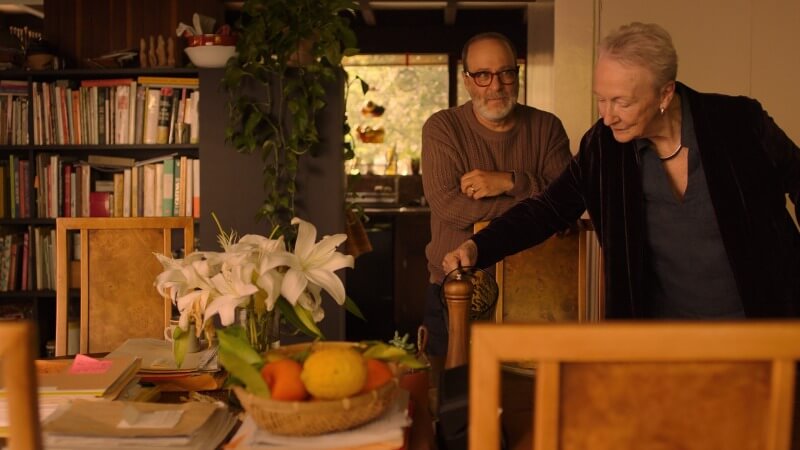Ache informs much of Sarah Friedland’s Familiar Touch, a still, gentle film about the ravages of time told with uncommon grace and dignity. Ache, for a life that’s gone by, and respect, not just for those whose time is nearing its end but also for those who strive to make these last years dignified and peaceful. It is a film attuned to decline, not just to the pain it can cause, but to how it refracts memory, presence, and touch. Above all else, it’s a film acutely aware of memory’s place in a person’s sense of identity, how it can unfairly slip through hands desperate to hold on.
Kathleen Chalfant plays Ruth, a woman whose presence of mind is slipping; in fact, her sense of place and time seems to shift with the breeze. The film begins with a gentleman caller arriving at her sunlit home to share a pleasant lunch. An outing is planned, but she forbids him to reveal where. He obliges—because a gentleman, as she reminds him, never spoils a surprise. This exchange, unhurried and oddly distant, evolves into a duet of mistaken identity and delicate misremembrance. The man tells her he’s an architect. She, smiling, says her father is a carpenter and that the man should meet him someday. “I’d like that,” he says guardedly but warmly. Her hand lingers on his leg flirtatiously. Lunch comes to an abrupt end. Recollection hits: she’s married. Then comes the present crashing in with harsh clarity: she knows where they’re going and, embarrassingly, who this man is. Not a suitor, but her son, Steve (an emotionally tousled H. Jon Benjamin).
A confrontation at this moment in Familiar Touch would have been painful, taxing, and expected. Instead, what follows is Ruth’s abrupt transition from home to here, bringing its own hurt without resorting to emotional manipulation. Steve has taken her to a retirement community, its warmth embodied in Vanessa (Carolyn Michelle Smith), an indefatigably kind nurse, and Brian (Andy McQueen), a resident doctor to whom Ruth immediately takes a liking. In a lesser film, Ruth’s age and condition would invite challenges from drama’s loftier, hackneyed tactics: dismissive doctors, rude and/or abusive staff, and a family that is too distant to visit and too distracted to help. Mercifully and refreshingly, Friedland’s gaze is clear and gracious, reassuring that Ruth is, and will remain, in good hands. Despite one more destructive lapse—Ruth tells Vanessa in front of her son that she never wanted children—Friedland never implies vindictiveness in Ruth, judgment in Vanessa, nor an absence of love in Steve. It’s a precarious moment executed with dramatic honesty, not strategy.
Another element soon emerges that aligns with the film’s lyrical title. As Ruth attempts to settle, she yearns—not just for stability but comfort, the residual desires from a life fully lived. When she asks for a menu in the dining room, the request—unnecessary though it may be—echoes that life, where choices and autonomy (and, it must be said, elegance) endowed her youth with power, a time when she could command a kitchen or make a man blush with her wit and charms. There are moments when she reaches to feel on her skin the things that used to make life so exciting and vivid. Sometimes, she seems to find them. Her eyes close, and Ruth vanishes inside. We are not invited in, but we can sense where she has gone, so palpably does Chalfant bring it to the fore.
Chalfant also imbues Ruth with a marvelous rebellious streak that leads to some of the film’s most entertaining, endearing, and revealing moments. There’s a cunning that simmers beneath Ruth’s lapses, along with a playfulness that age and time have yet to extinguish. The best scenes focus on her minor revolts: a traipse into the facility’s kitchens (where she makes a masterpiece of scrambled eggs and toast), an impromptu trip to the grocer, and an almost dreamlike stroll down a hallway, rendered in shadow, magenta light, and the odd crackle of electricity. These moments are not merely episodes; they’re flashbacks expressed through movement, her shifting hands and feet demonstrating the force of nature Ruth embodied in the spring of her life. “Grandma was kind of a babe,” her granddaughter (Katelyn Nacon) says, modeling in Ruth’s stylish coats. “Yeah, I suppose she was,” Steven replies, remembering.
Friedland’s intuition for and deftness of observation and physicality—a choreographer, she excels at giving her characters a voice via the ways they move through rooms, doorways, corridors—is matched in Chalfant. Together, they present Ruth’s interiority as elastic, expanding and contracting depending on her mental clarity. An indelible pool sequence, in which Ruth exercises in the arms of a care worker, takes on the swaying cadence of a dance. The movement is gentle and deliberate, and Friedland’s camera (guided by cinematographer Gabe Elder) swoons, never allowing Chalfant to leave the frame but also never confining her. Friedland lets her actor float, which, in turn, liberates Ruth to drift to some wonderful place meant just for her. We are curious about where she goes (and who is waiting for her there), but there’s something profoundly respectful in the way Familiar Touch lets her be, in the moment and never alone.
Director: Sarah Friedland
Writer: Sarah Friedland
Stars: Kathleen Chalfant, Carolyn Michelle Smith, Andy McQueen, H. Jon Benjamin
Release date: June 20, 2025
Jarrod Jones is a freelance critic based in Chicago, with bylines at The A.V. Club, IGN, and any place that will take him, really. For more of his mindless thoughts on genre trash, cartoons, and comics, follow him on Twitter (@jarrodjones_) or check out his blog, DoomRocket.
